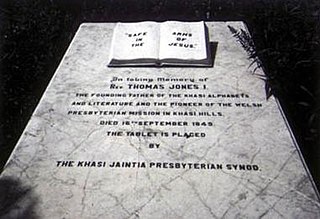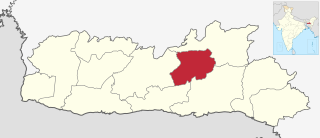Related Research Articles

Meghalaya is a state in northeast India. Meghalaya was formed on 21 January 1972 by carving out two districts from the state of Assam: (a) the United Khasi Hills and Jaintia Hills and (b) the Garo Hills. The estimated population of Meghalaya in 2014 was 3,211,474. Meghalaya covers an area of approximately 22,429 square kilometres, with a length-to-breadth ratio of about 3:1.

Shillong is a hill station and the capital of Meghalaya, a state in northeastern India. It is the headquarters of the East Khasi Hills district. Shillong is the 330th most populous city in India with a population of 143,229 according to the 2011 census. It is said that the rolling hills around the town reminded the British of Scotland. Hence, they would also refer to it as the "Scotland of the East".

The Khasi people are an ethnic group of Meghalaya in north-eastern India with a significant population in the bordering state of Assam, and in certain parts of Bangladesh. Khasi people form the majority of the population of the eastern part of Meghalaya, that is Khasi Hills, constituting 78.3% of the region's population, and is the state's largest community, with around 48% of the population of Meghalaya. They are among the few Austroasiatic-speaking peoples in South Asia. The Khasi tribe holds the distinction of being one of the few remaining tribes that have a matrilineal society. Under the Constitution of India, the Khasis have been granted the status of Scheduled Tribe.

Cherrapunji or Sohra is a sub-divisional town East Khasi Hills district in the Indian state of Meghalaya. It was the traditional capital of ka hima Sohra.

Jowai is the headquarters of the West Jaintia Hills district of the state of Meghalaya, India, and is home to the Pnar, a sub-tribe of the Khasi people. It is located on a plateau surrounded on three sides by the Myntdu river bordering Bangladesh to the south. Due to its high altitude of 1365 m above sea level, Jowai experiences warm summers with cool to chilly winters.

The Jaintia Kingdom was a matrilineal kingdom in present-day some parts of Bangladesh's Sylhet Division, India's Meghalaya state and Nagaon, Morigoan district of Assam. It was partitioned into three in 630 AD by Raja Guhak for his three sons, into the Jaintia Kingdom, Gour Kingdom and Laur Kingdom. It was annexed by the British East India Company in 1835. All the Pnar Rajahs of the Jaintiapur Kingdom are from the Syiem Sutnga clan, a Pnar clan of the Khasi tribe which claims descent from Ka Li Dohkha, a divine nymph.
The Pnar, also known as Jaiñtia, are a sub-tribal group of the Khasi people in Meghalaya, India. The Pnar people are matrilineal. They speak the Pnar Language, which belongs to the Austro-Asiatic language family and is very similar to the Khasi language. The Pnar people are natives of West Jaintia Hills and East Jaintia Hills District of Meghalaya, India. They call themselves as "Ki Khun Hynñiew Trep". Their main festivals are Behdeinkhlam, Chad Sukra, Chad Pastieh and Laho Dance.

Thomas Jones was a Welsh Christian missionary, who worked among the Khasi people of Meghalaya and Assam in India and of Bangladesh. He recorded the Khasi language in Roman script, and the inscription on his gravestone calls him "The founding father of the Khasi alphabet and literature".

Jaintia Hills Autonomous District Council (JHADC) is an autonomous district council in the state of Meghalaya in India. It is one of the three autonomous district councils within Meghalaya, and one of twenty-five autonomous regions of India. Present Jaintia hills was a part of historical Jaintia Kingdom. It was formed as the Jowai Autonomous District Council on 23 November 1964 from the Jowai Subdivision of the United Khasi-Jaintia Hills District – adopting its current name on 14 June 1973.
Skendrowell Syiemlieh was a Khasi folk and Gospel singer. He was a master musician and an accomplished artist of the folk instrument known as the duitara. He was also the playback singer for the Khasi film U Manik Raitong.
The Anglo-Khasi War was part of the independence struggle between the Khasi people and the British Empire between the years 1829-1833. The war started with Tirot Sing's attack on a British garrison that disobeyed orders of this Khasi king to stop a road construction project through the Khasi Hills. The Khasis were defeated in this war and the British gained supremacy over these hills.

The Khasi and Jaintia Hills are a mountainous region in India that was mainly part of Assam and Meghalaya. This area is now part of the present Indian constitutive state of Meghalaya, which includes the present districts of East Jaintia Hills district, headquarter Khliehriat, West Jaintia Hills district, headquarter Jowai, East Khasi Hills district, headquarter Shillong, and West Khasi Hills district, headquarter Nongstoin.
David Reid Syiemlieh is an Indian academician and the former Chairman of the Union Public Service Commission of India. He studied in Dr Graham's Homes, Kalimpong (1958–1970) and graduated with history honours from St.Edmund's College, Shillong. This was followed with a master's degree in History (1976), MPhil (1980) and PhD (1985) from the North Eastern Hill University, Shillong. He taught undergraduates in St. Edmund's College (1977–1979) before joining the Department of History, NEHU, in 1979. He rose in the profession to become a Professor in the Department of History. He held numerous positions in the University, including Dean of Students' Welfare; Head Department of History; Controller of Examinations; Registrar and Pro-Vice-Chancellor. Prof. Syiemlieh, is a former vice-chancellor, Rajiv Gandhi University, Doimukh, Arunachal Pradesh.

Neil Nongkynrih was an Indian concert pianist and conductor. He founded the Shillong Chamber Choir (SCC), which won the reality show India's Got Talent in 2010. He was awarded Padma Shri, the fourth highest civilian award of India in 2015.
Dkhar, is a term used by the Khasis to refer to non-Khasi people in Meghalaya. It is non derogatory but some perceived it as derogatory. For Khasis any non-tribal is a dkhar and they address them by that term. Sometimes the word dkhar have been collectively used with the term heathen (Non-believers), as most of the native Khasis are christian, While non-tribals are mainly hindu. In real, the term is mostly used against affluent Bengali Hindu settlers from West Bengal or the Bengali Hindu refugees from erstwhile East Pakistan It is sometimes abbreviated to ′Khar and may also denote a Khasi clan with the same name.
Hamlet Bareh Ngapkynta (1931-2012) was an Indian writer, historian and film director from the Northeast Indian state of Meghalaya. He is known as the first person from the Khasi tribe, an indigenous ethic group of the state, to secure a doctoral degree (PhD) and as the maker of the first feature film in Khasi language, Ka Synjuk Ri ki Laiphew Syiem. He was the chairman of the executive committee of the Rajiv Gandhi University, Arunachal Pradesh and a recipient of the 2004 Meghalaya Day Award. The Government of India awarded him the fourth highest civilian honour of the Padma Shri in 2004,
Tirot Sing Memorial College, established in 1987, is a general degree college situated at Mairang, in Meghalaya. This college is affiliated with the North Eastern Hill University. This college offers bachelor's degree in arts.

James Joy Mohan Nichols Roy was a Christian minister and politician from what is now the state of Meghalaya, India. Before the independence of India he agitated for autonomy of the tribal peoples of northeast India. After independence this was enshrined in the Sixth Schedule of the Constitution of India through his efforts.

Eastern West Khasi Hills is a district in the Indian state of Meghalaya, located approximately 25 kilometres (16 mi) west of the state capital of Shillong. It was created in 2021, after bifurcation of existing West Khasi Hills district. The territories which make up the district recorded a total population of 131,451 in the 2011 census. The district headquarters is the town of Mairang.
References
- 1 2 3 Simon, I. M. (ed.) (1991) Chapter II History Meghalaya District Gazetteers, Shillong Archived 7 March 2012 at the Wayback Machine
- 1 2 3 Eastern Panorama U Tirot Sing
- ↑ "Heroic Legacy: U Tirot Sing Day". North East Today. 17 July 2021.
- ↑ Immortal Martyrs, Government of Meghalaya Official State Portal Archived 2011-07-16 at the Wayback Machine
- ↑ May, Andrew (1 February 2017). Welsh missionaries and British imperialism: The Empire of Clouds in north-east India. Manchester University Press. pp. 73–74. ISBN 978-1-5261-1875-2.
- ↑ Buckland, C.E. (1906). "Burlton, Philip Bowles". Dictionary of Indian Biography. London: Swan Sonnenschein & Co. Lim.